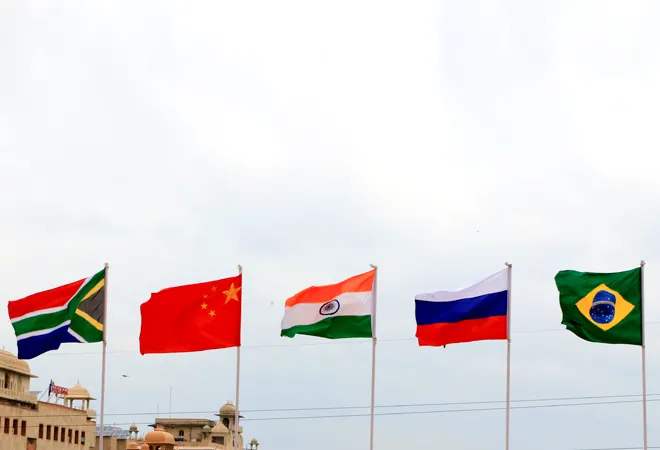
This piece is part of the series, India@75: Aspirations, Ambitions, and Approaches
Indian civilisation and culture may be the only ones in Asia—and likely in the whole world—that can balance the equally ancient and powerful Chinese traditions. With its massive size in many socio-economic dimensions, India is essential to the world geopolitical scenario. Equally important is its identity as a diverse and pluralistic, functioning democracy—qualities that place it at the forefront of game-changing nations.
The visibility that a rising India is experiencing—owning partly to the annual growth of at least five percent for nearly 40 years—brings new domestic demands and tough challenges to the country’s human capital. There is much to be done in building basic infrastructure, improving social indicators and bridging inequality, especially for India’s increasingly young population. If the country succeeds in achieving economic prosperity while maintaining its historically tolerant and multiple nature, the world—developing countries in particular—will certainly have an inspiring model to emulate.
There is much to be done in building basic infrastructure, improving social indicators and bridging inequality, especially for India’s increasingly young population.
Many opportunities lie ahead. India is well-suited for fully embracing the digital economy, leapfrogging classical stages in the manufacturing and even services sectors. The country’s conciliatory approach to disputes and its strategic autonomy policies are crucial in an increasingly fragmented world of non-global governance. India can aim to become an efficient and reliable international trouble-shooter, credible across continents.
Such an encompassing attitude is key in situations like those at the World Trade Organisation (WTO), for instance, where stubborn positions taken by key powers have left the institution in a serious stalemate. India’s outstanding track record in Geneva vis-à-vis its savvy diplomats—similar to those of another BRICS member, Brazil—will be instrumental in finding a solution that, in principle, must also be supported by China. Without India’s involvement, in a global alliance or key common purpose groups to restructure the WTO, failure is to be expected. The same applies to the recently contested World Health Organisation.
At the same time, India must rethink its health and trade policies. The fragile structure of its rural population, with complex relations with the agricultural sector and certain industrial practices, already makes both endeavours a difficult task. The geographical imbalances and the contrasting and competing Chinese exporting machine further exacerbate the problems.
The fragile structure of its rural population, with complex relations with the agricultural sector and certain industrial practices, already makes both endeavours a difficult task.
India’s immersion in the trade network of the Association of Southeast Asian Nations (ASEAN) along with Japan and South Korea demands a shift in policy, something evident in its refusal to participate in the Regional Comprehensive Economic Partnership (RCEP), involving ASEAN itself, Japan, South Korea, China, Australia and New Zealand. While India’s motives are understandable, it must shed its protectionist views and adopt a wiser trade strategy. This goes beyond the “non-reciprocal trade liberalisation policy” towards a few small neighbours or attempts to profit from the present economic tensions between the US and China.
A great India must also find stable solutions to the challenges brought about by its relationships with neighbours such as Pakistan and Bangladesh. This “neighbourhood deficit,” adding clay feet to the subcontinent giant, must cease; more diplomatic skills and stronger political will, combined with large doses of patience are required for sure.
If India acts as it can and deserves in the international scene, its projection in Iberian America, along with the clever inroads it has been making in Africa and Eurasia, will match the normal care dispensed to the US and European partners. Iberian America may seem strategically meaningless, since it lies outside of India’s sphere of influence, but the people of the region yearn for strong foreign partners besides those in the traditional Atlantic rule-making axis and the Chinese alternative.
In the post-COVID-19 world, relevant middle powers with fine negotiating skills and a co-operative attitude will stand out. The numerous roles that India is able to play in this scenario will aggravate latent dangers, stretching to perilous limits the number and capabilities of its human capital, as well as exposing prevailing domestic shortcomings.
Iberian America may seem strategically meaningless, since it lies outside of India’s sphere of influence, but the people of the region yearn for strong foreign partners besides those in the traditional Atlantic rule-making axis and the Chinese alternative.
Finally, no great power can subsist without joy: The joy of being what it is, of believing in its worldview. Think of the flourishing mid-1950s to mid-1960s United States, with Hollywood musicals framing with colour, song and dance the glory of the consolidated superpower. India, despite its manifold problems, is a land of colourful festivals and joyous celebrations. If Bollywood is a factory of illusions, it also shows the strength and creativity of a nation that may lead without causing fear or sadness, always aware of a lighter and many times brighter side of life—naïve at the surface, perhaps, but deeply engaging and constructive.
The views expressed above belong to the author(s). ORF research and analyses now available on Telegram! Click here to access our curated content — blogs, longforms and interviews.




 PREV
PREV


